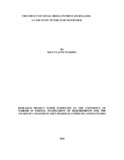| dc.description.abstract | This study examined the impact of social media on print journalism, with a focus on The Star, a Kenyan daily newspaper owned by Radio Africa Group. The study investigated how the advent of new media namely Facebook, Twitter, among other platforms, has affected newspaper circulation, readership, style of reporting and the extent to which newsroom has been reorganised to respond to social media influx. The study is pegged on three objectives namely: to find out how social media has changed (or not changed) the style of reporting in The Star, to investigate the structural newsroom operations in the face of new media, and to compare new media’s readership with print media. The study employed a qualitative approach and analysed resultant data thematically using priori and posteriori analyses. Observation and key informant interviews were used to generate data collection. Findings revealed that The Star newspaper’s market share was declining due to competition from social media content. Lack of compelling articles, inability by some editors to adjust to the reality of the day, lack of innovative strategies of selling the paper were quoted as some of the factors that hinder the paper from reclaiming its market. The study found out that despite the challenges, the Star is coming up with new strategies of reaching a wider audience. The findings conclude that social media has affected the performance of print newspapers. Although the older generation of readers accustomed to print newspaper continue to buy the product, young people, who are the majority, rely on Facebook and Twitter for news, which has led to decline in newspaper circulation. Social media platforms thus pose challenges inasmuch as they complement print newspaper, raising concerns such as plagiarism. The study recommends that the Media Council of Kenya reins on plagiarism by lobbying for laws to curb the vice. It also recommends that the Star builds capacity of its staff to enable them to adapt to new emerging demands of social media, especially in content generation. | en_US |



